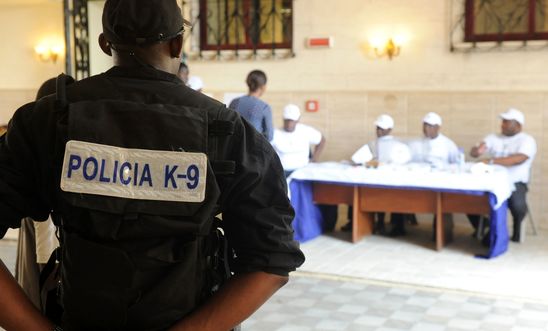
Press releases
Equatorial Guinea: President Nguema's 'gruesome' 40 years of human rights abuses

‘Muzzling of dissent has had a devastating and chilling effect’ - Marta Colomer
Repressive measures such as torture, extra judicial executions, arbitrary arrests used by the world’s longest serving president
Video testimony with torture survivor Ramon Esono Ebalé available
On the 40th anniversary of President Teodoro Obiang Nguema Mbasogo seizing power in Equatorial Guinea, Amnesty International is calling for authorities to immediately end human rights violations and abuses.
On 3 August 1979, President Nguema took power following a successful coup.
Since then, he has presided over an alarming decline in human rights in the country - implementing repressive measures such as torture, extra judicial executions, arbitrary arrests, and the persecution of political activists and human rights defenders.
Marta Colomer, Amnesty International’s West Africa Senior Campaigner, said:
“For decades, President Nguema’s muzzling of dissent has had a devastating and chilling effect on human rights defenders, journalists and political activists. They have been persistently targeted solely for exercising their right to freedom of expression, peaceful assembly and association.
“It is time for President Nguema to close this gruesome chapter of his government’s human rights record and usher in a new era where human rights are fully and effectively respected, protected, promoted and fulfilled.
“There have been glimpses of hope, like the 2006 law forbidding torture and President’ Nguema’s recent announcement of a draft law to abolish the death penalty.
“However, unless his government takes meaningful steps to enforce the law, fully respect human rights and end repression, the number of victims of human rights violations in Equatorial Guinea will continue to grow. This must stop.”
Tortured Prisoners
Since President Nguema’s appointment, police in Equatorial Guinea have regularly tortured detainees to extract confessions, this is despite the November 2006 law forbidding the practice.
Such cases have been well documented by Amnesty over the years and often involve torture of opposition members and political activists. Reports have included people being beaten with rifles, kicked and punched and had part of their ears severed with razor blades and bayonets.
Documented reports of torture under President Nguema’s rule include:
- Joaquín Elo Ayeto, an activist and member of the opposition party Convergence for Social Democracy who was arrested on 25 February this year at his house in Malabo. He was beaten severely while at the police station and hung up by his hands. He is currently still in detention.
- Prisoner of conscience Primo Jose Esono Mikali temporarily lost use of his limbs after being suspended from the ceiling by a rope.
- Ten members of the People’s Union political party were arrested and tortured in Bata and Malabo police stations in 2009. One detainee told the investigating magistrate that on one occasion he was tied up on the floor and offered money to “confess”. On another occasion, the police stuffed paper in his mouth, put him in a sack which was then tied and suspended and beat him.
- The torture of 15 prisoners, who were released after their sentences were reduced in a clemency measure in August 1988.
- Members of the Bubi ethnic group, the indigenous population of Bioko Island in the northern most part of the country, have also been tortured to extract confessions. Bubi women were publicly humiliated in the courtyard of the police station in Malabo. Some were forced to swim naked in the mud in front of other detainees and others were sexually abused. At least six detainees reportedly died after being tortured.
Corrupt Courts and Extrajudicial Executions
Executions under President Nguema started a month after the coup that brought him to power and have continued, with soldiers and police reportedly carrying out extrajudicial executions:
- In September 1979, death sentences were handed down to seven men, including former President Masie Nguema. Less than five hours later they were all executed by firing squad.
- On 14 May 2012, a detainee, Blas Engó, was shot at close range by a soldier outside Bata prison as he tried to escape with 46 others during the night. In the same month, a military officer in Bata shot dead Oumar Koné, a Malian national, for refusing to pay a bribe at a road block.
- In January 2014, nine men convicted of murder were executed, 13 days before a temporary moratorium on the death penalty was established.
- On 5 February 2015, dozens of children were among 300 youths arbitrarily arrested and beaten following protests during the African Cup of Nations in Malabo. They were taken to Malabo Central Police Station, where they received 20 to 30 lashes each, and held in overcrowded and poorly ventilated cells occupied by adult criminal suspects.
- One hundred and twelve people were convicted during a mass trial that took place in the city of Bata for an alleged coup attempt in December 2017.
- Political opponent and activist Bertin Koovi is still being detained in the city of Bata, despite a court ruling calling for his immediate release in April this year.
As President Nguema marks 40 years in power, Amnesty has today launched a video interviewing a torture survivor under his rule, Ramon Esono Ebalé: https://youtu.be/1CBCd8WUoYQ